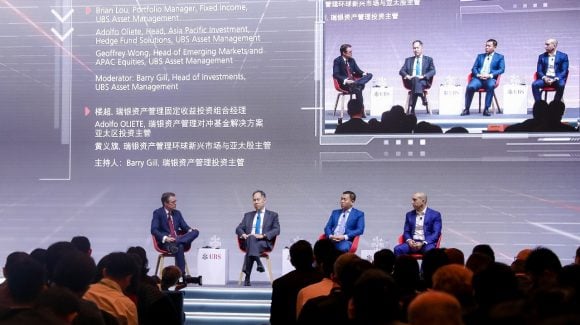CHIPS not BRICS
Why a CHIPS standalone investment strategy may be a better way to capture growth in China's equity and bond markets than a BRICS approach.

Moderator:
- Barry Gill, Head of Investments, UBS Asset Management
Panelists:
- Geoffrey Wong, Head of Emerging Markets and APAC Equities, UBS Asset Management
- Adolfo Oliete, Head of Asia Pacific Investment, Hedge Fund Solutions, UBS Asset Management
- Brian Lou, Portfolio Manager, Fixed Income, UBS Asset Management
Key takeaways
Key takeaways
- Global investors remain underinvested in China, despite China's outperformance over the years;
- But investors can find a whole range of opportunities in China's onshore markets;
- Reforms have improved access and China looks attractive from a return and diversification perspective;
- China's inefficient markets create a unique opportunity for active investors;
- A China-focused, Highly Concentrated, Index Agnostic, Portfolio strategy (CHIPS) may offer the best approach to capturing alpha opportunities onshore
Barry Gill opened the session by observing that when the BRICS acronym was coined in 2001, no one could have foreseen China's impact on global growth, or how it would outperform the other BRICS countries.
Given China's performance, there's a strong case to invest in it via a dedicated strategy, i.e. a CHIPS approach (China-focused, highly concentrated, index agnostic, portfolio strategy), rather than as part of an emerging markets strategy.
However, the world remains underinvested in China, despite higher sovereign and corporate debt yields, attractive equity valuations, and low correlations vs global bond and equity benchmarks.
To explore the reasons why global investors remain underinvested in China and what opportunities they may be missing, Barry led an in-depth Q&A with UBS AM experts from a range of asset classes.
1. Global investor allocation to Chinese fixed income markets is negligible despite attractive risk-adjusted yields. What is keeping international investors on the sidelines?
1. Global investor allocation to Chinese fixed income markets is negligible despite attractive risk-adjusted yields. What is keeping international investors on the sidelines?
Brian Lou started by pointing out that access restrictions to onshore markets are no longer an impediment for global investors. Recent reforms, like Bond Connect, CIBM Direct and QFII, have opened onshore markets, but only a few overseas institutions - such as UBS AM - have the infrastructure to trade into China's onshore markets.
Speaking more broadly, Brian said onshore credit ratings standards and low liquidity in onshore bond markets have been limiting factors. However, Brian said that China is bringing overseas competition into the onshore credit ratings system and implementing reforms to address investors' concerns.
Looking ahead, Brian expects onshore ratings reforms, negative yields on fixed income markets around the world, and the inclusion of Chinese bonds in global indices, will likely push overseas investors to raise their allocations to China in the coming years.

Find out more about how index inclusion is changing China's bond markets.
2. How important are the Bond and Stock Connect programs for global investors?
2. How important are the Bond and Stock Connect programs for global investors?
Brian said that Bond Connect is helping global investors get involved in China's onshore market and is a much quicker process in terms of setting up and operations than the QFII programs used before.
Geoffrey Wong said that Stock Connect has made a big difference for international investors.
Firstly, that's because it has made it easier for investors to trade in and out of China's onshore equities markets.
Secondly, set-up processes have been simplified so it takes about the same time to set up a Stock Connect trading account as it does for a standard brokerage account. Finally, Stock Connect has reduced trading costs.
Adolfo Oliete added that the Stock Connect is also a valuable tool for overseas-based hedge fund investors because it allows them to short A-share stocks, thus opening up alpha generation opportunities.
Watch the one minute story of Stock Connect investing here:
3. What’s different about China and the opportunity set today for equity investors that would merit them having a dedicated allocation?
3. What’s different about China and the opportunity set today for equity investors that would merit them having a dedicated allocation?
Geoffrey explained that China can warrant a dedicated exposure because it is unique in many respects.
Firstly, China offers scale that other countries do not. For example, if you take two identical companies in terms of quality and expertise, the one based in China will have a much longer growth runway because of the size of the addressable market.
Secondly, China is also experiencing a series of structural changes, like urbanization, ageing population, and the shift from an investment-led to a consumer-driven economy, that are creating winners and losers.
Thirdly, Geoffrey observed a unique mentality on his research trips to China, 'whether companies are big or small, they are driven to be the best in the world – and you don't see this so prominently in other emerging markets.
The last time I saw that was in the early East Asian Tiger economies, like Japan, Singapore and Taiwan, and that kind of mentality produced companies like Sony and Samsung who ended up being world leaders.'
Finally, Geoffrey said that as an EM manager there will be a risk limit to how much you want to put into China. But for an end investor convinced about the strategic vision of higher returns available in China, then perhaps a separate allocation will provide the kind of weighting required to meet the investor's return objectives.

Find out more about the four forces driving China's economy.
4. It is remarkable how much active return can be generated in China. What explains this and how long do you expect this to persist?
4. It is remarkable how much active return can be generated in China. What explains this and how long do you expect this to persist?
Geoffrey said that onshore markets are inefficient and that he estimates the average holding period on China's equity markets is around two days and that more than 80% of turnover is driven by retail investors.
That means on many days, retail investors set the price for stocks trading on the markets, which creates inefficiencies that active, fundamentally-driven investors may exploit.
Geoffrey explained that mutual funds are growing their presence in onshore markets, but that China's equity markets are likely to remain retail-driven for at least the next five years. As such, there's a good opportunity now for professional, active investors to exploit the inefficiencies in China's markets.
From a hedge fund perspective, Adolfo Oliete added that China's onshore equity markets are a quarter of the size of those in the US, but trade almost as much in dollar terms. Additionally, most of the turnover comes from investors with accounts of less than USD 10,000, who create volatility that hedge funds may exploit.

5. In developed markets there has been a pronounced move towards private market, or alternative investing since the Great Financial Crisis. Do you see the same thing happening in China? And if global investors want to allocate their capital in a similar manner in China do the vehicles exist to do so?
5. In developed markets there has been a pronounced move towards private market, or alternative investing since the Great Financial Crisis. Do you see the same thing happening in China? And if global investors want to allocate their capital in a similar manner in China do the vehicles exist to do so?
Adolfo Oliete said there is much more interest in hedge funds in China, particularly on the equity side and that APAC accounts for a significant part of his team's portfolios, where China is a big part, if not the majority.
Adolfo continued to say that his team has a greater Asia-Pacific equity long-short exposure allocation within their portfolios than with the US, because he believes these markets can generate the most alpha, particularly in China.
6. What major regulatory steps need to take place to unleash growth in hedge fund-type strategies?
6. What major regulatory steps need to take place to unleash growth in hedge fund-type strategies?
Adolfo said that more hedging instruments are needed.
He said he'd like to see more shorting ability on both the equity and fixed income side, with an increase in local inventory and capacity for options. More widely, Adolfo cited access to commodity markets from offshore.
Adolfo ended by saying that he is definitely seeing regulatory change move in the right direction, but that there is more work to do.
7. When selecting active hedge fund managers in China, what mix are you looking for between global managers in China and local managers?
7. When selecting active hedge fund managers in China, what mix are you looking for between global managers in China and local managers?
Adolfo said, 'our bias is to go very local, because that’s where we think the value add comes from because local managers are more often than not ahead of the curve when it comes to generating alpha in China.'
8. Looking more broadly, China's debt levels are high compared to historical levels and also to other countries around the world – should investors be concerned that this will derail China's longer term growth prospects?
8. Looking more broadly, China's debt levels are high compared to historical levels and also to other countries around the world – should investors be concerned that this will derail China's longer term growth prospects?
Brian added that China's debt levels don't concern him too much because the economy still continues to grow. Additionally, he said that China is taking definitive steps to address the debt pile, via deleveraging policies, to limit any systemic risk.
Geoffrey finished the discussion by saying that he doubts China will experience a debt crisis.
Firstly, that's because over 60% of China's debt is state-owned enterprise and local government debt, which is borrowed from state-owned banks and concentrated within the government.
Secondly, the debt is all locally funded rather than by foreign investors, which is very different to the Latin American crisis of the 1980s or the Asian crisis of the 1990s.
Finally, Geoffrey said that China still has a lot of growth potential. Unlike the Japan situation in 1990, China still has a lot of productivity gains ahead of it.
Geoff cited education statistics, saying that an average of 14% to 15% of the populations in OECD countries have university degrees, but in China around 24% of people under 25 years of age have university degrees.
For Geoffrey, that means China will have a much better educated population entering the workforce in the coming years, compared to their elders and the existing labor force and that may support productivity growth in the future.
Adolfo said it is something to be mindful of, but high debt levels are not necessarily a bad thing for hedge fund strategies because they create volatility and trading opportunities. A bigger risk would be a rollback in the opening of China's onshore financial markets to global investors.
9. How do you build in ESG analysis into your China strategies?
9. How do you build in ESG analysis into your China strategies?
Geoffrey said that ESG databases are not a particularly reliable source of insight and that 'you really need boots-on-the-ground research and turn up at the warehouses, drink tea and coffee with local businesspeople to gauge the reputation of the companies you are looking into.'
Barry summarized the different insights from the panel as being highly relevant to a CHIPS approach because investors can find a whole range of opportunities in China's onshore markets, China looks attractive from a return and diversification perspective, and that inefficient markets create a unique opportunity for active investors.
